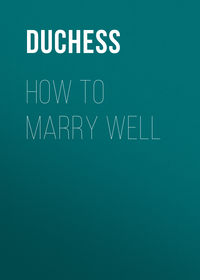 полная версия
полная версияFaith and Unfaith: A Novel
"You dare not!" says Sartoris, in a stifled tone, confronting him fully for the first time.
"That is just as you please to think," says Branscombe, turning upon him with flashing eyes. He frowns heavily, and, with a little gesture common to him, raises his hand and pushes the end of his fair moustache between his teeth. Then, with a sudden effort, he controls himself, and goes on more quietly: "I shall always feel regret in that you found it so easy a matter to believe me guilty of so monstrous a deed. I think we can have nothing further to say to each other, either now or in the future. I wish you good-evening."
Sartoris, standing with his back almost turned to his nephew, takes no heed of this angry farewell; and Dorian, going out, closes the door calmly behind him.
Passing through the Long Hall, as it has been called from time immemorial, he encounters Simon Gale, the old butler, and stops to speak to him, kindly, as is his wont, though in truth his heart is sore.
"Ah, Simon! How warm the weather grows!" he says, genially brushing his short hair back from his forehead. The attempt is praiseworthy, as really there is no hair to speak of, his barber having provided against that. He speaks kindly, carelessly – if a little wearily. His pulses are throbbing, and his heart beating hotly with passionate indignation and disappointment.
"Very warm, sir," returns the old man, regarding him wistfully. He is not thinking of the weather, either of its heat or cold. He is only wondering, with a foreboding sadness, whether the man before him – who has been to him as the apple of his eye – is guilty or not of the crime imputed to him. With an effort he recovers himself, and asks, hastily, though almost without purpose, "Have you seen my lord?"
"Yes; I have only just left him."
"You will stay to dinner, Mr. Dorian?" He has been "Mr. Dorian" to him for so many years that now the more formal Mr. Branscombe is impossible.
"Not to-night. Some other time when my uncle – " He pauses.
"You think him looking well?" asks the old man, anxiously, mistaking his hesitation.
"Well! Oh, that doesn't describe him," says Branscombe, with a shrug, and a somewhat ironical laugh. "He struck me as being unusually lively, – in fact, 'strong as Boreas on the main.' I thought him very well indeed."
"Ay, he is so! A godly youth brings a peaceful age; and his was that. He has lived a good life, and now is reaping his reward."
"Is he?" says Dorian, with a badly-suppressed yawn. "Of course I was mistaken, but really it occurred to me that he was in an abominable temper. Is a desire to insult every one part of the reward?"
"You make light of what I say," returns Simon, reproachfully, "yet it is the very truth I speak. He has no special sin to repent, no lasting misdeed to haunt him, as years creep on. It were well to think of it," says Simon, with a trembling voice, "while youth is still with us. To you it yet belongs. If you have done aught amiss, I entreat you to confess, and make amends for it, whilst there is yet time."
Dorian, laying his hands upon the old servant's shoulders, pushes him gently backwards, so that he may look the more readily into his face.
"Why, Simon! How absolutely in earnest you are!" he says, lightly. "What crime have I committed, that I should spend the rest of my days in sackcloth and ashes!"
"I know nothing," says old Gale, sadly. "How should I be wiser than my masters? All I feel is that youth is careless and headstrong, and things once done are difficult of undoing. If you would go to your grave happy, keep yourself from causing misery to those who love you and —trust in you."
His voice sinks, and grows tremulous. Dorian, taking his hands from his shoulders, moves back from the old man, and regards him meditatively, stroking his fair moustache slowly, in a rather mechanical fashion, as he does so.
"The whole world seems dyspeptic to-day," he says, ironically. Then, "It would be such a horrid bore to make any one miserable that I daresay I sha'n't try it. If, however, I do commit the mysterious serious offence at which you broadly hint, and of which you plainly believe me fully capable, I'll let you know about it."
He smiles again, – a jarring sort of smile, that hardly accords with the beauty of the dying day, – and, moving away from the old man, crosses the oaken flooring to the glass door that lies at the farther end of the room, and that opens on to a gravelled path outside, on which lilacs are flinging broadcast their rich purple bloom. As he moves, with a pale face and set lips (for the bitter smile has faded), he tramples ruthlessly, and without thought for their beauty, upon the deep soft patches of coloring that are strewn upon the flooring from the stained-glass windows above.
Throwing open the door, he welcomes gladly the cool evening air that seems to rush to meet him.
"Pah!" he says, almost aloud, as he strides onwards beneath the budding elms. "To think, after all these years, they should so readily condemn! Even that old man, who has known me from my infancy, believes me guilty."
Then a change sweeps over him. Insults to himself are forgotten, and his thoughts travel onward to a fear that for many days has been growing and gaining strength.
Can Horace have committed this base deed? This fear usurps all other considerations. Going back upon what he has just heard, he examines in his mind each little detail of the wretched history imparted to him by his uncle. All the suspicions – lulled to rest through lack of matter wherewith to feed them – now come to life again, and grow in size and importance in spite of his intense desire to suppress them.
On Tuesday night the girl had left her home. On Tuesday morning he had been to Horace's rooms, had found him there, had sat and conversed with him for upwards of an hour on different subjects, – chiefly, he now remembers, of Clarissa Peyton.
The day had been warm, and he had taken off his coat (the light overcoat he had affected for the past month), and had thrown it on a chair, and —left it there when going!
The next morning he had called again and found the coat in the very self-same place where he had thrown it. But in the mean time, during all the hours that intervened between the afternoon of one day and the forenoon of another, where had it been?
"The very coat you wore was minutely described." – The words come back upon him with a sudden rush, causing him a keener pang than any he has ever yet known. Must he indeed bring himself to believe that his own brother had made use of the coat with the deliberate intention (should chance fling any intruder in the way) of casting suspicion upon him – Dorian?
In the dusk of the evening any one might easily mistake one brother for the other. They are the same height; the likeness between them is remarkable. He almost hates himself for the readiness with which he pieces his story together, making doubt merge with such entirety into conviction.
The evening is passing fair, yet it brings no comfort to his soul; the trees towering upwards lie heavily against the sky; the breath of many flowers makes rich the air. Already the faint moon arising, throws her "silver light o'er half the world," and makes more blue the azure depths above:
"Star follows star, though yet day's golden lightUpon the hills and headlands faintly streams."The far-off grating sound of the corncrake can be heard; the cuckoo's tuneless note, incessant and unmusical, tires the early night. The faint sweet chirrups of many insects come from far and near, and break upon the sense with a soft and lulling harmony:
"There is no stir, nor breath of air; the plainsLie slumbering in the close embrace of night."All nature seems sinking into one grand repose, wherein strife and misery and death appear to have no part.
To Dorian the tender solemnity of the scene brings no balm. To go again to town by the night mail – to confront Horace and learn from him the worst – is his one settled thought, among the multitude of disordered ones; and upon it he determines to act.
But what if he shall prove innocent, or deny all knowledge of the affair? What then can clear Dorian in his uncle's eyes? And even should he acknowledge the fact that he had enticed the girl from her home, how can it benefit Dorian? He is scarcely the one to defend himself at another's expense; and to betray Horace to clear himself would be impossible to him.
He grows bewildered and heart-sick. Reaching home, he orders his dog-cart to be brought round, and, by taking it a good deal out of his good gray mare, he manages to catch the evening train to town.
Lord Sartoris, sitting brooding over miserable thoughts in the library at Hythe, has tidings brought him of his nephew's speedy return to London, and endures one stab the more, as he feels now more than ever convinced of his duplicity.
Arrived in town, Branscombe drives to Horace's rooms, hoping against hope that he may find him at home. To his surprise he does so find him, – in the midst of papers, and apparently up to his eyes in business.
"Working so late?" says Dorian, involuntarily, being accustomed to think of Horace, at this hour, as one of a chosen band brought together to discuss the lighter topics of the day over soup and fish and flesh. In truth, now he is on the spot and face to face with his brother, the enormity of his errand makes itself felt, and he hardly knows what to say to him.
"You, Dorian?" Horace, raising his eyes, smiles upon him his usual slow impenetrable smile. "Working? Yes; we others, the moneyless ones, must work or die; and death is unpopular nowadays. Still, law is dry work when all is confessed." He presses his hand to his forehead with affected languor, and for an instant conceals his face. "By the by, it is rather good of you to break in so unexpectedly upon my monotony. Anything I can do for you?"
"Let me speak to you," says Dorian, impulsively, laying his hand upon his arm. "If I am wronging you in my thoughts I shall never forgive myself, and you, in all probability, will never forgive me either; yet I must get it off my mind."
"My dear fellow, how you have flung away undoubted talent! Your tone out-Irvings Irving: it is ultra-tragic. Positively, you make my blood run cold. Don't stand staring at me in that awful attitude, but tell me, as briefly as you can, what I have done."
He laughs lightly.
Dorian regards him fixedly. Has he wronged him? Has instinct played him false?
"Where is Ruth Annersley?" he asks, awkwardly, as though getting rid of the question at any price and without preamble. He has still his hand upon his brother's arm, and his eyes upon his face.
"Ruth Annersley?" reiterates Horace, the most perfect amazement in his tone. If purposely done, the surprise is very excellent indeed. "Why? What has happened to her?"
"Have you heard nothing?"
"My dear fellow, how could I? I have not been near Pullingham for a full month; and its small gossips fail to interest our big city. What has happened?"
"The girl has left her home; has not been heard of since last Tuesday. They fear she has wilfully flung up happiness and honor to gain – misery."
"What a charitable place is a small village!" says Horace, with a shrug. "Why should the estimable Pullinghamites imagine so much evil? Perhaps, finding life in that stagnate hole unendurable, Ruth threw up the whole concern, and is now seeking a subsistence honorably. Perhaps, too, she has married. Perhaps – "
"Why do you not suppose her dead?" says Dorian, tapping the table with his forefinger, his eyes fixed moodily on the pattern of the maroon-colored cloth. "All such speculations are equally absurd. I hardly came to London to listen to such vain imaginings."
"Then – I think I barely understand you," says Horace, amicably; "you came because – ?"
"Because I fancied I had here the best chance of hearing about her," interrupts Dorian, bluntly, losing patience a little.
"How fearfully you blunder!" returns Horace, still quite calmly, – nay, in even a tone that might be called amused. "If you mean that I have had anything to do with her vamoose, I beg to say your imagination has run wild. You can search the place if you like. The old lady who attends to my wants will probably express some faint disapprobation when you invade the sanctity of her chamber, but beyond that no unpleasantness need be anticipated. This is her favorite hour for imbibing brandy —my brandy, you will understand (she takes it merely as a tonic, being afflicted – as she tells me – with what she is pleased to term 'nightly trimbles'): so if, in the course of your wanderings, you chance to meet her, and she openly molests you, don't blame me."
"Is that all you can tell me?"
"All about my old lady, certainly."
"And of Ruth?"
"I know nothing, as you should understand." He laughs significantly.
"What do you mean?" demands Dorian, a little fiercely. His eyes are dark and flashing, his lips compressed.
"What can I mean, except that you are ridiculously absurd?" says Horace, rising. "What is it you expect me to say? I can't get you out of it. I always knew you had a penchant for her, but never thought it would carry you so far. If you will take my advice, however, you will be milder about it, and take that look off your face. If you go in for society with that cut-up expression in your eyes, people will talk."
"Then you know nothing?" repeats Branscombe, taking no notice of – perhaps not even hearing – the foregoing speech.
"Absolutely nothing. How should I?" says Horace, with his soft smooth smile. "Have a brandy-and-soda, Dorian, or a little curaçoa? Perhaps, indeed, the brandy will be best (always allowing Mrs. McGinty has left me any), you look so thoroughly done up."
"Thank you, – nothing." He gazes at his brother long and earnestly. "The Branscombe word ought to be sure," he says, moodily.
"Still unconvinced!" says Horace, with an airy laugh. "I know I ought to take you by the shoulders, Dorian, and pitch you down the stairs; but, somehow, I haven't the pluck to-night. I am overdone through this abominable law, and – you are such a tremendous fellow when compared with me. Must you really be off so soon? Stay and have a cup of coffee? No? Well, if it must be, good-night."
Dorian goes down the stairs, – puzzled, bewildered, almost convinced. At the foot of the staircase he looks up again, to see Horace standing above him still, candle in hand, radiant, smiling, débonnaire, apparently without a care in the world.
He nods to him, and Dorian, returning the salute in grave and silent fashion, goes out into the lighted streets, and walks along in momentary expectation of a hansom, when a well known voice smites upon his ear:
"What in the name of wonder, Branscombe, brings you here?"
Turning, he finds himself face to face with Sir James Scrope.
"My presence is hardly an eighth wonder," he says, wearily. "But how is it you are not in Paris?"
"Fate ordained it so, and probably fortune, as I just want a friend with whom to put in an evening."
"You have chosen a dull companion," says Dorian, stupidly. "What brought you home so soon? or, rather, what took you to Paris originally?"
"Business partly, and partly because – er – that is, I felt I needed a little change."
"Ah! just so," says Branscombe. But he answers as one might who has heard nothing. Sir James casts upon him a quick penetrating glance.
"Anything wrong with you, Branscombe?" he asks, quietly. "Anything in which I can be of use to you?"
"Thank you, no. I'm just a little down on my luck, that's all." Then, abruptly, "I suppose you have heard of the scandal down in Pullingham?"
"About that poor little girl?" says Sir James. "Oh, yes. 'Ill news flies apace;' and this morning Hodges, who came to town to see me about Bennett's farm, gave me a garbled account of her disappearance. I think I hardly understand even now. How did it happen?"
For a full minute Dorian makes no reply. He is looking earnestly in James Scrope's face, to see if in it there lurks any hidden thought, any carefully concealed expression of mistrust. There is, indeed, none. No shadow, no faintest trace of suspicion, lies in Scrope's clear and honest eyes. Branscombe draws a deep breath. Whatever in the future this friend may come to believe, now, at least, he holds him – Dorian – clear and pure from this gross evil that has been imputed to him.
He throws up his head with a freer air, and tries, with a quick effort, to conquer the morbid feeling that for hours past has been pressing upon him heavily.
"I know nothing," he says, presently, in answer to Sir James's last remark.
"It is such an unaccountable story," says Scrope, lifting his brows. "Where did she go? and with whom? Such a quiet little mouse of a girl, one hardly understands her being the heroine of a tragedy. But how does it particularly affect you?"
Branscombe hesitates. For one brief moment he wonders whether he shall or shall not reveal to Scrope the scene that has passed between him and his uncle. Then his whole sympathies revolt from the task, and he determines to let things rest as they now are.
"Arthur has tormented himself needlessly about the whole business," he says, turning his face from Scrope. "He thinks me – that is, every one – to blame, until the girl is restored to her father."
"Ah! I quite see," says James Scrope.
CHAPTER XXIII
"Her eyes were deeper than the depthOf waters stilled at even.""Dorian?" says Clarissa.
"Clarissa!" says Dorian.
"I really think I shall give a ball."
"What?" cries a small, sweet, plaintive voice from the corner, and Georgie, emerging from obscurity and the tremendous volume she has been studying, comes to the front, in her usual vehement fashion, and stands before Miss Peyton, expectation in every feature. "Oh, Clarissa, do say it again."
"Papa says I must entertain the county in some way," says Clarissa, meditatively, "and I really think a ball will be the best way. Don't you?"
"Don't I, though?" says Miss Broughton, with much vivacity. "Clarissa, you grow sweeter daily. Let me offer you some small return for your happy thought."
She laughs, and, stooping, presses her warm ripe lips against her friend's cheek. She blushes as she performs this graceful act, and a small, bright, mischievous gleam grows within her eye. The whole action is half mocking, half tender:
"A rosebud set with little wilfulthorns,And sweet as English air can make her, she."The lines come hurriedly to Branscombe's mind, and linger there. Raising her head again, her eyes meet his, and she laughs, for the second time, out of the pure gladness of her heart.
"I think it was my happy thought," says Branscombe, mildly. "I suggested this dance to Clarissa only yesterday. Might not I, too, partake of the 'small return'?"
"It no longer belongs to me; I have given it all away, – here," says Georgie, touching Clarissa's cheek with one finger; "but for that," with a slow adorable glance, "I should be charmed."
"I think I shall get pencil and paper and write down the names," says Clarissa, energetically, rising and going towards the door. "Dorian, take care of Georgie until I return."
"I wish I knew how," says Branscombe, in a tone so low that only Georgie can hear it. Then, as the door closes he says, "Did you mean your last speech?"
"My last? What was it? I never remember anything." She very seldom blushes, but now again a soft delicate color creeps into her face.
"If you hadn't given it all away, would you have given me a little of that small return?"
"No."
"Not even if I were to give a ball for you?"
"N-o – no."
"Not if I were to do for you the one thing you most desired?"
"No – no – no!" She speaks hastily, and glances at him somewhat confusedly from beneath her long lashes.
"Well, of course, it is too much to expect," says Branscombe; "yet I would do a good deal for you, even without hope of payment."
He comes a little nearer to her, and lays his hand upon the table close to hers.
"If you really made the suggestion to Clarissa, you deserve some reward," says Georgie, nodding her head. "Now, what shall it be?"
"Dance half the night with me."
"That would bore you, – and me. No; but if dancing delights you – sir – may I have the pleasure of the first quadrille?"
"Madam," says Branscombe, laying his hand upon his heart, "you do me too much honor; I am at your service now and forever."
"It is too large a promise."
"A true one, nevertheless."
A little earnest shade shows itself upon his face, but Georgie laughs lightly, and moves away from him over to the window, and at this moment Clarissa returns, armed with paper and pencils and a very much pleased smile.
"Can't I have the gardens lighted?" she says, "with Chinese lanterns, and that? I have been thinking of it."
"I don't know about 'that,'" says Dorian. "I'm not sure but it might blow us all to atoms; but the celestial lights will be quite 'too, too!' It must be a splendid thing, Clarissa, to have a brain like yours. Now, neither Miss Broughton nor I have a particle between us."
"Speak for yourself, please," says Miss Broughton, very justly incensed.
"I'm doing even more than that, I'm speaking for you too. Don't put up too many Chinese lanterns, Clarissa, or it will be awkward: we shall be seen."
"What matter? I love light," says Georgie, innocently. "How I do hope there will be a moon! Not a mean effort at one, but a good, round, substantial, vast old moon, such as there was two months ago."
She has her wish: such another moonlight night as comes to Pullingham on the night of Miss Peyton's ball has been rarely, if ever, seen. It breaks over the whole place in a flood of light so whitely brilliant that the very sleeping flowers lift up their heads, as though believing the soft mystic light to be the early birth of morn.
All around is calm and drowsy sweet. The stars come forth to light the world, and, perhaps, to do homage to Clarissa on this the night of her first ball.
About six weeks have passed since Ruth Annersley left her home, and as yet no tidings of her have reached Pullingham. Already people are beginning to forget that such an esclandre ever occurred in their quiet village. The minutest inquiries have been made (chiefly by Lord Sartoris, who is now very seldom at home); rewards offered; numerous paragraphs, addressed to "R. A.," have appeared in the London papers, but without result. The world is growing tired of the miserable scandal, and Ruth's disappearance ceases to be the one engrossing topic of conversation at village teas and bar-room revelries.
To-night is fair enough to make one believe sin impossible. It is touched by heaven; great waves of light, sent by the "silver queen of night," lie languidly on tree and bower; the very paths are bright with its stray beams.
"Bats and grisly owls on noiseless wings" flit to and fro, "and now the nightingale, not distant far, begins her solitary song."
Within, music is sounding, and laughter, and the faint sweet dropping of fountains. Clarissa, moving about among her guests, is looking quite lovely in a pale satin trimmed heavily with old gold. She is happy and quite content, though her eyes, in spite of her, turn anxiously, every now and then, to the doorway.
Every one is smiling, radiant. Even Dorian, who is waltzing with any one but the woman he desires, is looking gracious all through, and is creating havoc in the bosom of the damsel who has rashly intrusted herself to his care.
Cissy Redmond, in the arms of a cavalry-man, is floating round the room, her unutterable little nez retroussé looking even more pronounced than usual. Her face is lit up with pleasurable excitement; to her – as she tells the cavalry-man without hesitation – the evening is "quite too awfully much, don't you know!" and the cavalry-man understands her perfectly, and is rather taking to her, which is undoubtedly clever of the cavalry-man.
He is now talking to her in his very best style, and she is smiling, – but not at him.
Within the shelter of a door, directly opposite, stands Mr. Hastings, and he is answering back her smile fourfold. He will not dance himself, – conscience forbidding, – yet it pleases him to see his Cissy (as she now is) enjoying herself. The band is playing "Beautiful Ferns" dreamily, languidly; and I think at this very moment Mr. Hastings's reverend toes are keeping excellent time to the music. But this, of course, is barest supposition; for what human eye can penetrate leather?









